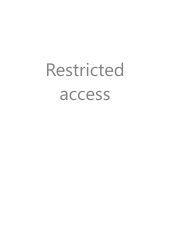Climate change law and law of the sea through the lens of regime interaction: A regime interaction study
Permanent link
https://hdl.handle.net/10037/34407Date
2024-06-28Type
MastergradsoppgaveMaster thesis
Author
Aron, ChristineAbstract
The fact climate change and the ocean are interrelated in a physical sense opens up the question whether the same can be said for the regimes governing them. While it appears obvious that they should interact, it is not clear that they do. At the first glance it seems that the climate change regime and the law of the sea regime do not take account of each other. The core instruments of the law of the sea regime do not mention climate change directly, and neither do the instruments of the UN climate change regime refer to the ocean, apart from its role as a sink. Through the lens of regime interaction further interactions may be discovered, be it normative overlaps or institutional interactions. This thesis seeks to analyze both regimes through the lens of regime interaction in order to assess whether they support one another in addressing climate change and the adverse effects to the marine environment.
Publisher
UiT Norges arktiske universitetUiT The Arctic University of Norway
Metadata
Show full item recordCollections
Copyright 2024 The Author(s)
The following license file are associated with this item:
Except where otherwise noted, this item's license is described as Attribution-NonCommercial-ShareAlike 4.0 International (CC BY-NC-SA 4.0)
Related items
Showing items related by title, author, creator and subject.
-
Sealing regimes. A regime theoretical analysis of the effects of EU-regulations
Karlsen, Rune (Master thesis; Mastergradsoppgave, 2017-05-15)This thesis utilizes the framework of Regime Theory to analyze the relationship between legislation implemented within one actor and the effects of this legislation in other actors of the same regime. The legislation I have chosen to exemplify this is Regulation (EC) No 1007/2009, which has been implemented within the EU. This regulation effectively bans all products derived from seal from the ... -
The Roles of Cities, Industries, and Public as Stakeholders in Combating Marine Plastic Pollution within the Framework of the Emerging Plastic Regime (Plastic treaty) Why are these stakeholders relevant and how should they be included in the plastic regime
Pataki, Apostolia Margarita (Mastergradsoppgave; Master thesis, 2024-07-01)Marine plastic pollution presents a critical issue that impacts numerous nations and populations. Various international treaties currently address different sources of marine pollution, primarily structured around a conventional state-centric conception. Despite these efforts, these frameworks have not successfully prevented the influx of plastic waste into marine ecosystems. To date, no single ... -
Climate change law and law of the sea through the lens of regime interaction: A regime interaction study
Aron, Christine (Mastergradsoppgave; Master thesis, 2024-06-28)The fact climate change and the ocean are interrelated in a physical sense opens up the question whether the same can be said for the regimes governing them. While it appears obvious that they should interact, it is not clear that they do. At the first glance it seems that the climate change regime and the law of the sea regime do not take account of each other. The core instruments of the law of ...


 English
English norsk
norsk


